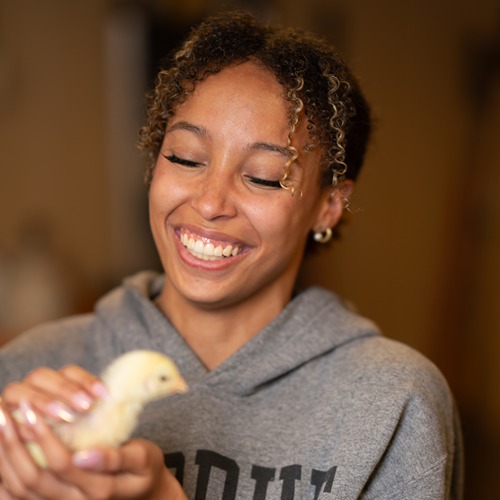Purdue Extension shares insights about organic certification
Despite rapid growth in consumer demand for organic products that outpaces domestic supply, certified organic land accounts for less than 2% of U.S. farmland and even less in Indiana. Purdue Extension’s Organic Agriculture educators are working with farmers to understand and address the common challenges and perceptions that accompany organic farm transition and certification.
Purdue Extension received funding from the North Central Sustainable Agriculture Research and Education Program of the United States Department of Agriculture (NCR-SARE) to perform a research and education study to support Indiana grain farmers with organic transition. Led by Michael O’Donnell, Purdue Extension organic and diversified agriculture educator, and Analena Bruce, assistant professor at the University of New Hampshire and former Indiana University postdoctoral researcher, the team surveyed Indiana grain farmers and identified barriers. The publication, Supporting the wider adoption of organic certification for Indiana grain farmers, shares the findings of over 300 farmers, ranging from those who use only conventional agriculture methods to those already using organic methods.
“The idea was to get a better understanding of farmer perceptions of the opportunity, challenges and barriers around transitioning to organic agriculture. It was interesting to me, an Extension educator who directs organic programs, to look at those results and think how this informs my extension programming,” said O’Donnell.
Challenging production problems identified are production loss due to weed pressure, certification ineligibility caused by GMO pollen drift, and crop damage and contamination caused by pesticide drift. Conventional farmers noted that a lack of successful organic farmers in there is is a major obstacle because they have limited opportunities to speak with someone who has successfully transitioned.
The study also identified opportunities for further research and investment in education and outreach programs for Indiana farmers. Notable opportunities include policy initiatives to address concerns about imported organic grains market competition and new Extension programs to support organic farms.
“This project highlights a need for increased funding for research and Extension efforts to better support farmers with production-related challenges along with critical policy initiatives. I encourage farmers to become aware of the challenges facing the organic industry so they can provide input to the National Organic Standards Board (NOSB), a federal advisory board that represents organic farmers nationwide,” O’Donnell said.
Farmers can participate at the NOSB fall 2020 meeting, held online beginning Oct. 20. The public is encouraged to submit written comments or register to make an oral comment by Thursday (Oct. 1). More information about the NOSB fall meeting can be found at ams.usda.gov/event/national-organic-standards-board-nosb-meeting-cedar-rapids-iowa.






